Nine new PhD students joined BCAM the last year
Basque Center for Applied Mathematics – BCAM has welcomed to the center a new group of PhD students for the course 2023-2024 and they have joined the rest students, who number 9 in total.
They are going to work mostly in mathematics and informatics, but in the different research groups at BCAM. Below you will find more information about the doctoral theses they will be working on:
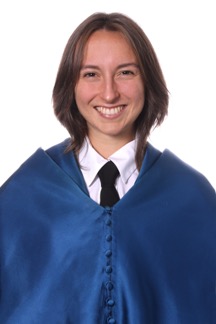
Claudia Peña (BCAM PhD Student)
I have a degree in Mathematics from the Complutense University of Madrid, which I completed in September 2022. While I was studying this career, I discovered a special interest in Mathematical Analysis, especially in Differential and Integral Calculus, Differential Equations, and Measure Theory. That’s why I wrote my Final Degree Project about The Fourier Transform and its applications to Partial Differential Equations, under the supervision of María Jesús Carro Rossell. After finishing the degree, I took the master’s degree in advanced mathematics at the Complutense University of Madrid, choosing the speciality of analysis, which I completed in July 2023. I did my master’s degree Final Project about the Boundedness of singular integral operators, again under the direction of María Jesús Carro Rossell.
Project: “Spectral theory and PDEs: Real and Fourier Analysis”
Abstract: I'm working between the areas of harmonic analysis and PDEs. More specifically, I apply analytical tools to the study of changes in the topology of the flux lines over time of the solutions to Navier-Stokes and MHD equations, i.e., vortex reconnection and magnetic reconnection, respectively. I also study the well-posedness of these equations.
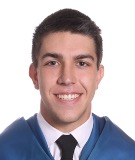
Álvaro Jiménez (BCAM PhD Student)
I studied Mathematics Bachelor at Universidad Complutense de Madrid (2018-2022) and a master’s degree in advanced mathematics (2022-2023) in the same university. My final projects were Morse Homology (Bachelors final project) and Introduction to Lipschitz Geometry of Singularities (Master's dissertation).
Project: “Applications of Moderately Discontinuous Algebraic Topology to the study of Singularities”
Abstract: Lipschitz Geometry of Singularities has had a great development in the last 20 years. There are already great results in this area, such as the Lipschitz study of Zarinski's Multiplicity conjecture or the relation between the Zariski multiplicity and Lipschitz multiplicity. Up to now, the Lipschitz geometry of low-dimensional objects is quite well understood. However, there are still many open questions in higher dimensional cases and also on how this Geometry is related to central objects in Singularity Theory such as the Milnor Fibration, resolution of singularities or equisingularity. Moreover, in the last few years, my thesis advisors introduced a new theory of Lipschitz Algebraic Topology that can be useful to describe this Geometry.
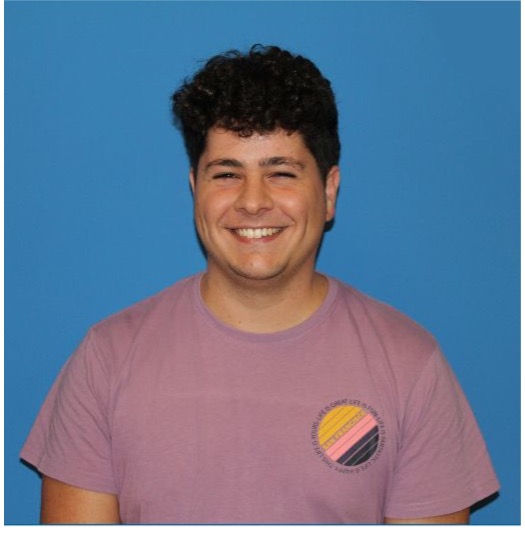
Raúl Coterillo (BCAM PhD Student)
Degree in Physics and Master's in Theoretical Chemistry and Computational Modelling, both from the University of Cantabria. I have been working at BCAM as a technician in the Machine Learning group since September of last year.
Project: "Understanding Spiking Neural Networks with Non-equilibrium Spin Models"
Abstract: The project explores the dynamic behavior of SNNs by employing non-equilibrium spin models as a novel framework for analysis. Through a combination of theoretical modeling, computational simulations, and empirical validations, the thesis seeks to enhance our comprehension of the intricate dynamics within neural networks. The findings are expected to contribute valuable insights into the design and optimization of artificial neural networks, fostering advancements in the fields of neuroscience and artificial intelligence.

Andrés Espinosa (BCAM PhD Student)
I studied for a bachelor's degree in Mechanical Engineering from Universidad Nacional de Colombia (graduation year: 2017) and a Master's degree in Mechanical Engineering from Universidad Nacional de Colombia (graduation year: 2022). Finally, I am a PhD Student in Engineering Physics at BCAM-UPV/EHU, Severo Ochoa PhD fellowship (starting year: 2024)
Project: I am not currently assigned to a specific project. I only have confirmation that I will be working with the "CFD Modelling and Simulation Group" under the direction of Marco Ellero.

Elías Guisado (BCAM PhD Student)
I have studied a double bachelor's degree in mathematics and physics at the University of Seville, and a master's in mathematics at the University of Bonn.
The project is still to be determined. Elias will be supervised by Ilya Smirnov (BCAM). He works on the STAG research line (Singularity Theory and Algebraic Geometry) inside of MP (Mathematical Physics). This research line aims to develop new methods in Singularity Theory designed to approach the solution of several classical conjectures that have resisted current methods in singularity theory and explore new interactions of singularities with the latest developments in nearby areas. In this research the researchers focus mainly in Singularities appearing in Algebraic Geometry.
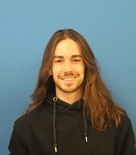
Rubén de la Fuente (PhD Student)
I did my Bachelor's in Physics in the University of the Basque Country and I studied a Master's degree in Mathematical Physics in the University of Tübingen. After that, I worked for a short while as a software engineer. I am joining BCAM from January 2024 to start my PhD project under Luz Roncal in the Harmonic Analysis group.
Project: “Uniqueness results for the Schrödinger equation on graphs”
Abstract: The Hardy uncertainty principle relates the decay of a function to that of its Fourier transform. It can be also interpreted as a uniqueness result for the free Schrödinger and heat equations. One recent trend of interest concerns uniqueness properties for the Schrödinger equation with a discrete Laplacian defined on some particular meshes. We will try to prove similar results in the more general context of graphs and see which conditions we have to impose over the structure of the graph to obtain such properties.
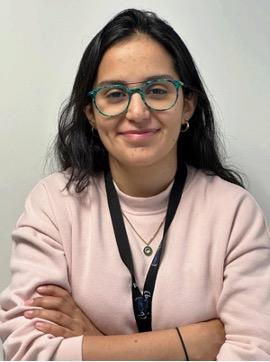
Daniela Moreno (PhD Student)
Daniela is a PhD student at the Basque Center for Applied Mathematics BCAM and the University of the Basque Country UPV-EHU. Her PhD research is in the CFD-MS group. Here, she studies the virus' passive transport, modeling the viruses as decorated nanoparticles. In particular, she characterizes the nanoparticles using numerical and computational methods, such as the Rigid multi-blob (RMB) and the Smoothed Dissipative Particle Dynamics (SDPD). Additionally, she is working on characterizing nanoparticles with partial slip conditions, such as the Janus particles. Her academic journey includes completing a master’s degree in Mechanical Engineering from the Universidad Nacional de Colombia in 2022. Her research was focused on biological modelling (root growth in plants), mainly at geometrical branching shapes, applying the finite elements method FEM using a reaction-diffusion model. In 2021, she started her career as a research technician in the CFD-MS research group in BCAM, modeling and simulating passive virus transport.
Project: "Mesoscopic Fluid Dynamics Modelling of Virus Transport"
Abstract: The strong impact of viral propagation on the world population's health is evident, as demonstrated by current scenarios such as the SARS-Cov-2 pandemic. Other viruses, including HIV, herpes, dengue, and influenza, have been prevalent for many years and continue to cause fatalities and decreased quality of life. Studying the virus's spread is crucial to understanding and addressing this persistent problem. Our research focuses on the mesoscopic-scale transmission of viruses, with particular attention to the role of thermal fluctuations that affect the transport of the viruses. The transport is affected by the envelope and protein structures. To explore the effect of the structures on the mobility of the virus, we have identified viruses with similar morphology, including SARS-CoV-2, HIV, dengue, influenza, herpes, and SARS-CoV. The present research proposes adaptable virus models that employ numerical particle methods such as SDPD, SPH, and RMB. These models are designed to analyze and characterize hydrodynamically the physics of viruses and determine their transport.
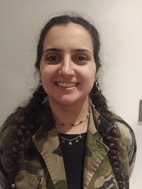
Alba Larraya (PhD Student)
I studied for a degree in Mathematics at the University of Zaragoza, and then the interuniversity Master's degree in Modeling and Mathematical Research, Statistics, and Computing. I have joined BCAM in the Singularity Theory and Algebraic Geometry group, with Javier Fernández de Bobadilla as supervisor at BCAM and Miguel Angel Marco Buzunariz at the University of Zaragoza.
The project is still to be determined. Alba will be supervised by Javier Fernández de Bobadilla (BCAM) and Miguel Marco (Universidad de Zaragoza). She works on the STAG research line (Singularity Theory and Algebraic Geometry) inside of MP (Mathematical Physics). This research line aims to develop new methods in Singularity Theory designed to approach the solution of several classical conjectures that have resisted current methods in singularity theory and explore new interactions of singularities with the latest developments in nearby areas. In this research, the researchers focus mainly in Singularities appearing in Algebraic Geometry.
Lander Rodríguez (PhD Student)
I finished the BSc in Industrial Engineering in the University of the Basque Country and I was awarded with the Outstanding Graduation Award being 1st of the 2016 promotion. Later, I finished a double degree MSc in Industrial Engineering and Aerospace Manufacturing in the University of the Basque Country and Cranfield University, and I was awarded with first class honours.
Project: “COVID-19 in the Basque Country. Analysis of the different pandemic waves”
Abstract: The starting point of the project is a database that contains all the COVID-19 positives from March 1, 2020, until January 9, 2022 that occurred in the Basque Country. This large database includes sociodemographic data, comorbidities, and basal treatments together with the adverse outcomes of COVID-19, such as hospitalization, ICU or death. The idea of the project is to make use of different statistical and Machine Learning methods, both in supervised and unsupervised settings, to provide a more profound understanding of the pandemic. For instance, it is intended to develop an application based on predictive models of the adverse outcomes of COVID-19; analyse the influence of the comorbidities and their combinations in the different waves; identify patient profiles; identify spatio-temporal patterns of the disease; and to understand the influence of socioeconomic and sociodemographic factors.
Related news
Women in Science




